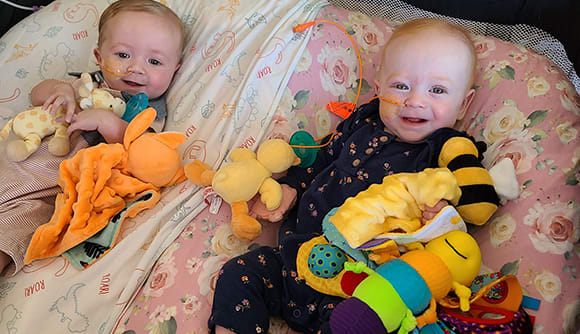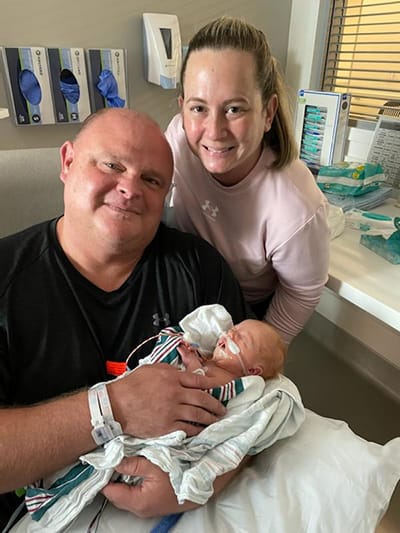Twin hearts
Miracle babies born with heart defects go home.
Article Author: Vikki Mioduszewski
Article Date:

Tracey Grissom knew at a very young age that she wouldn’t be able to go through childbirth. She was born with a very rare, complex congenital heart condition called a “Swiss cheese” defect. This occurs when there are multiple ventricular septal defects (VSDs), or holes in the wall that separates the right and left sides of the heart.
“I had my first open-heart surgery when I was 8 months old to repair the largest VSD,” Tracey said. “I also had a pacemaker put in when I was 15 years old due to my original repair disrupting the electrical system of my heart. I knew I wouldn’t be able to carry a baby due to my heart condition.”
Still, Tracey knew she would be a mother someday. When she met and fell in love with her now-husband Paul nearly 10 years ago, she knew she’d found the future father of her children. The St. Augustine couple married nearly five years ago and in late 2019, started in vitro fertilization (IVF) treatment. The couple went through three rounds of IVF to have healthy embryos to use in a gestational surrogate. The Grissoms were thrilled to hear the wonderful news on December 13, 2021, that they were going to have boy/girl twins via a gestational surrogate.
Testing reveals heart issues
Because of Tracey’s history of congenital heart disease (CHD), their surrogate’s obstetrician connected the Grissoms early on with pediatric cardiologist Rajesh Shenoy, MD, medical director of Pediatric Cardiology for the C. Herman and Mary Virginia Terry Heart Institute at Wolfson Children’s Hospital. After a 12-week ultrasound, Dr. Shenoy told the parents-to-be their babies would both be born with a congenital heart defect and that the Terry Heart Institute pediatric cardiac imaging experts would monitor the twins throughout the pregnancy.
“At that checkup, we heard two strong heartbeats,” Paul remembered. “It was an incredible feeling, but we were still scared.”
“We knew our son Riley had a very large VSD like I did, and our daughter Emery had both an ASD (a hole in the upper chamber of the heart) and a VSD,” Tracey said. “We had such trust in Dr. Shenoy. He was so honest and caring. We could ask him any question and he would answer it.”
Dr. Shenoy and the surrogate’s OB recommended that Riley and Emery be delivered at Baptist Medical Center Jacksonville, home to a trusted high-risk obstetric program and a Wolfson Children’s Hospital Cardiovascular Intensive Care Unit (CVICU).
The babies were set to be delivered during a planned C-section Monday, July 18, 2022, due to their congenital heart defects. However, the surrogate went into labor on Thursday, July 14, and Riley and Emery Grissom were born on Friday, July 15, each with their own cardiovascular team.
Riley and Emery were immediately transferred to the CVICU in the Borowy Family Children’s Critical Care Tower at Wolfson Children’s Hospital. Because Riley’s medical needs were more intense than Emery, they were in separate but adjoining patient suites. The size of the new suites, which opened on February 22, 2022, allowed the new parents to stay overnight comfortably with their newborns.
About six weeks after his birth, Riley required a pulmonary artery banding procedure to help regulate the poor blood flow between his heart and lungs that resulted from his significant heart defect. This was performed by Michael Shillingford, MD, MBA, surgical director and chief of Pediatric Cardiothoracic Surgery at the Wolfson Children’s Terry Heart Institute. Riley will need heart surgery in the near future; Emery’s congenital heart conditions will eventually require either cardiac catheterization or an open-heart surgical repair when she is about four or five years old.
An added worry
Soon after Riley’s birth, UF College of Medicine – Jacksonville pediatric medical geneticist Pamela Trapane, MD, medical director of the Duran Genetics Center at Wolfson Children’s Hospital, noted that the baby boy had an abnormal-appearing wrist and ordered genetic testing. This revealed that Riley also had a rare genetic condition called Holt-Oram syndrome, which causes skeletal abnormalities of the hands and arms and is often associated with a congenital heart defect. This disorder affects 1 in 100,000 live births, according to the National Organization for Rare Disorders.
Because her twin has Holt-Oram syndrome, Emery had genetic testing and her results confirmed she has the same syndrome.
A Thanksgiving blessing
Emery went home to her parents on July 20, 2022. Riley, who had more complex medical issues, went home on November 22, 2022.
Paul and Tracey were thrilled to have their children home for Thanksgiving. “It was the most wonderful Thanksgiving we could have imagined,” Tracey said. “During their hospital stay, since they were in separate rooms due to their different medical issues, we had never gotten a picture of them together. We were able to get one when Riley came home.”
The Grissoms are grateful to the Wolfson Children’s Hospital team. “We knew we could trust our babies with this expert team,” Tracey said.
The Terry Heart Institute at Wolfson Children's Hospital specializes in the diagnosis and treatment of congenital heart disease, heart rhythm disorders, and acquired heart conditions. Please visit WolfsonChildrens.com/LittleHearts or call 904.202.8550 for more information.

Paul and Tracey Grissom hold baby Emery in the NICU at Wolfson Children's Hospital.



